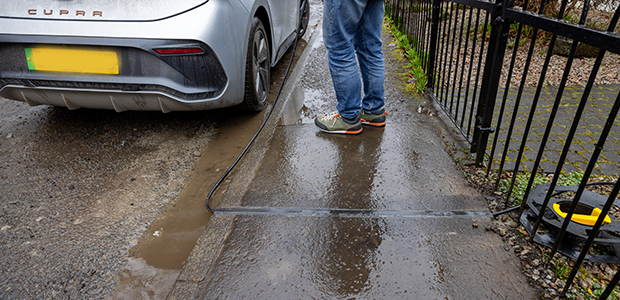
Dragons’ Den’s EV charging startup begins trials in Scotland
Kerbo Charge unveiled the installation of under-pavement charging channels in Stirling, marking the first such deployment in Scotland.
This trial is transforming the way homeowners without driveways can conveniently charge their electric vehicles (EVs) directly from their residences. This initiative is part of a series of rollouts aimed at facilitating the transition to electric vehicles for residents, thereby supporting the UK's ambition to achieve its net zero objectives.
The concept of the trial was introduced to the council by Stephen Gordon, a local resident of Stirling, who discovered the solution during an online search. Without access to a driveway, Mr. Gordon was hesitant to transition from a petrol-powered vehicle to an electric one, citing the inconvenience and high costs associated with public charging facilities. Motivated by their own goals towards a fossil fuel-free future, the Stirling council eagerly sought out innovative solutions to encourage residents to adopt electric vehicles.
Recent figures from Zap Map reveal that the cost of public charging presents no financial incentive for drivers to switch from petrol/diesel vehicles to electric ones unless charging can be done at home. Home charging costs an individual approximately £680 annually, in stark contrast to the £1,820 incurred by those dependent on public charging facilities. In comparison, operating a petrol vehicle costs about £1,470 per year. With roughly 40% of UK households relying on street parking, the expense associated with public charging stands as a substantial obstacle to the wider adoption of electric vehicles (EVs).
To tackle this issue of cost disparity, the Kerbo Charge initiative has embarked on a trial to install under-pavement charging channels in residential areas. This innovative approach enables residents to charge their EVs directly from the street using their own electricity supply. To charge their vehicles, users simply insert their charging cable into the channel, which features a self-sealing lid that closes securely after the cable, similar to how a zipper operates.
This method not only mitigates the hazard of tripping over cables laid across pavements but also ensures the charging infrastructure blends smoothly with the existing pavement, thanks to its slim and shallow design. Furthermore, the choice of PVC for the channels significantly reduces the carbon footprint compared to metal options, aligning with the environmental benefits of EVs.
Stirling resident Stephen Gordon said: “Stirling council is very forward thinking with roadside charging and with the Kerbo Charge channel install, other councils will have to follow suit to keep up. I’m really happy with the result, it looks perfect, and you definitely don’t notice it on the pavement.”
Kerbo Charge Co-Founder, Michael Goulden said: “Thousands of residents across Scotland are ready to move to electric, but only when they can charge at home. We hope councils across Scotland will follow Stirling’s lead and make these available for their residents. We want to highlight that they are 100% privately funded with no cost to the taxpayer.”
The Stirling trial is part of a series of planned local authority rollouts for customers with on-street parking.
Kerbo Charge is already available in nine local authorities in England, including Central Bedfordshire, Milton Keyes and Nottinghamshire, and residents can find out if they are eligible by visiting https://www.kerbocharge.com/enter-your-postcode. Prices start at £999 including fitting and obtaining approvals from the local authority, which typically pays for itself within nine months compared to the cost of public charging.

